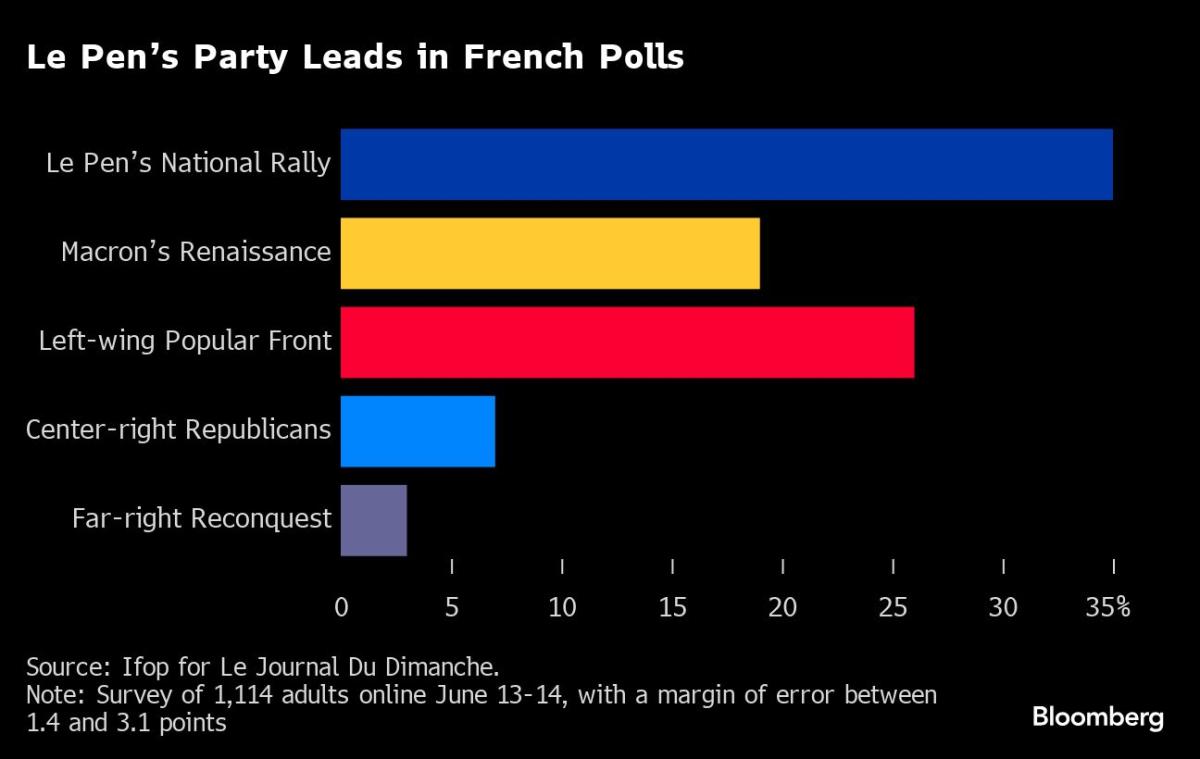(Bloomberg) — The European Union’s 27 leaders are gathering for summit talks with French President Emmanuel Macron’s decision to call a snap parliamentary election fueling concerns of further advances for the far right.
Most Read from Bloomberg
The ruling parties in France and Germany both suffered humiliating defeats to their nationalist opponents in last week’s elections for the European Parliament in which the far-right saw gains across the continent and the Greens suffered losses.
Those results will be looming over the discussions in Brussels as the group begins the process of choosing who should lead its most important institutions — the European Commission, the European Council, the EU foreign-policy service and the parliament. The leaders might be able to lock down an agreement Monday night, officials said.
Any more instability or gridlock would be costly for the EU which is in the grip of a new trade battle with China, wrestling with how to finance a ramp up in defense spending and preparing for the possibility of another Donald Trump presidency in the US.
Here’s what to watch:
Top Jobs
The leaders are nearing an agreement on who will fill the top positions and may conclude a deal by the time the informal dinner is over on Monday, according to people familiar with the state of the negotiations. This would be the ideal outcome for the EU, with member states seeking to avoid a political vacuum that would add to the sense that the bloc is drifting.
The process of filling those posts is a complicated, back-room negotiation, which weighs geographical balance and, more importantly, which political parties are entitled to the most consequential roles.
The Short List
The most likely outcome would see European Commission President Ursula von der Leyen continue at her job while former Portuguese Prime Minister Antonio Costa will take over responsibility for convening EU leaders’ summits as European Council president, said the people, who spoke on the condition of anonymity. Estonian Prime Minister Kaja Kallas is in line to become the EU’s top diplomat and Roberta Metsola would remain as president of the European Parliament.
Agreement on that line up is solidifying, said senior EU diplomats. One suggested there is a basic agreement in place, although they counseled that Monday’s dinner is an informal meeting and so the decision most likely won’t be officially endorsed until a formal summit on June 27 and 28.
Not all the names will necessarily get a political nod on Monday, said one of the people. But von der Leyen will likely receive informal approval from the leaders, as momentum has been picking up in support of her bid.
“After the result of the EU elections, everything speaks for a second term of Ursula von der Leyen,” Chancellor Olaf Scholz told German broadcaster Welt on the sidelines of the G-7 summit. “The goal should be now to agree quickly on the whole package. And I’m sure that will happen.”
Trouble in France
The political turmoil in France was a hot topic at the G-7 meeting in southern Italy last week, and it’s likely to come up at the informal summit as well, one of the people said. The leaders will likely discuss the snap French election and what impact it will have on EU business.
Marine Le Pen’s far-right party is on track to score another thumping victory over Macron and could be in position to appoint the next prime minister of France.
Le Pen over the weekend was reaching out to moderates to insist that she would be a responsible steward of the French economy, even as Macron and his allies warned that a victory for her nationalist party could trigger a financial crisis in France.
Long-Term Plans
The leaders are also set to discuss political priorities for the next term, with more defense spending a growing priority, despite serious divisions over how to finance it. Some countries have suggested issuing more joint debt but that’s met with stiff opposition from others, including Germany.
The European Green Deal is also likely to be discussed, with the increase in support for the far-right indicating voters’ growing fears over the cost of eliminating CO2 emissions. The commission has already floated a new 2040 target of reducing carbon by 90% from 1990 levels, an idea the heads of government are expected to debate later this year.
–With assistance from Arne Delfs, Zoe Schneeweiss and Alberto Nardelli.
Most Read from Bloomberg Businessweek
©2024 Bloomberg L.P.

